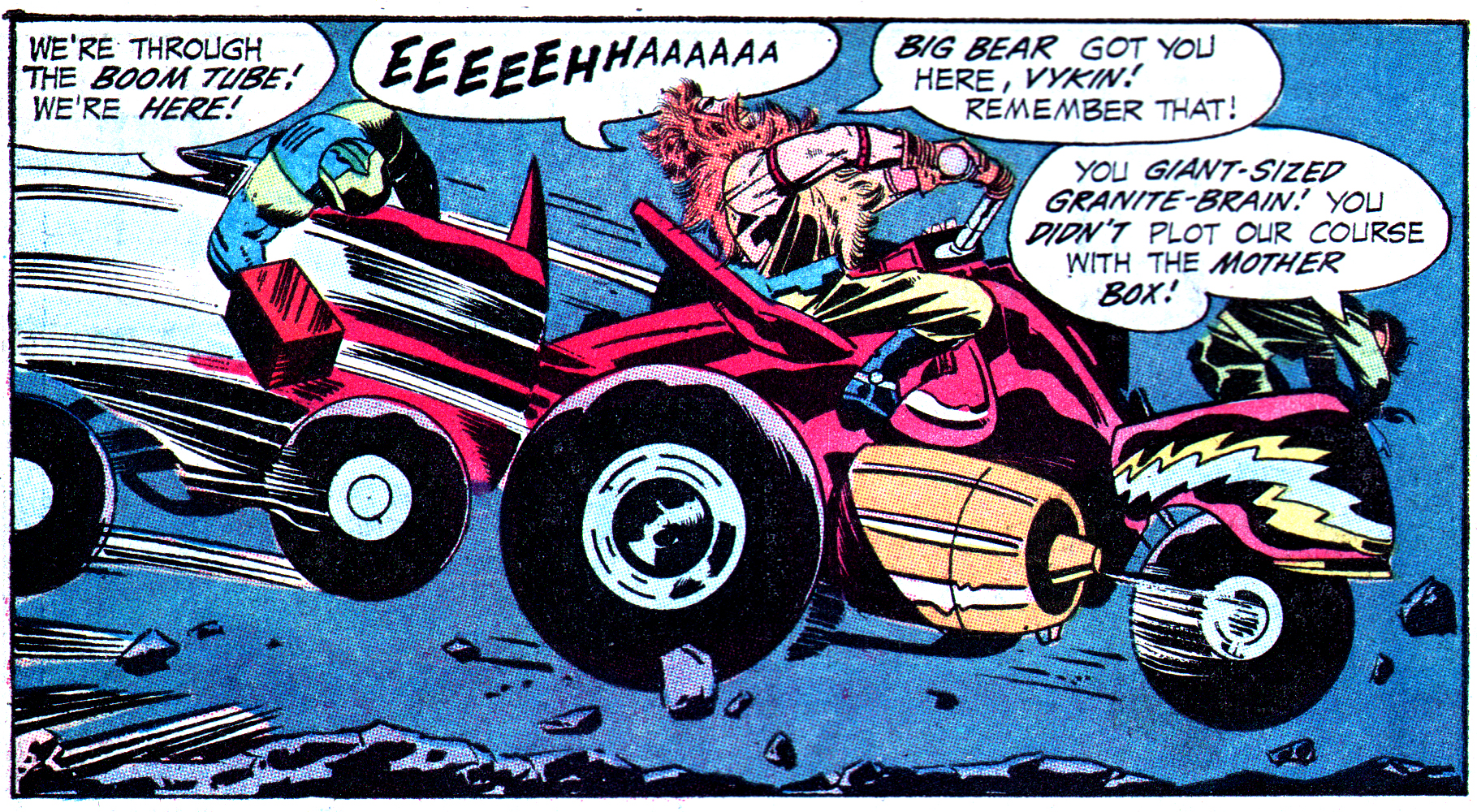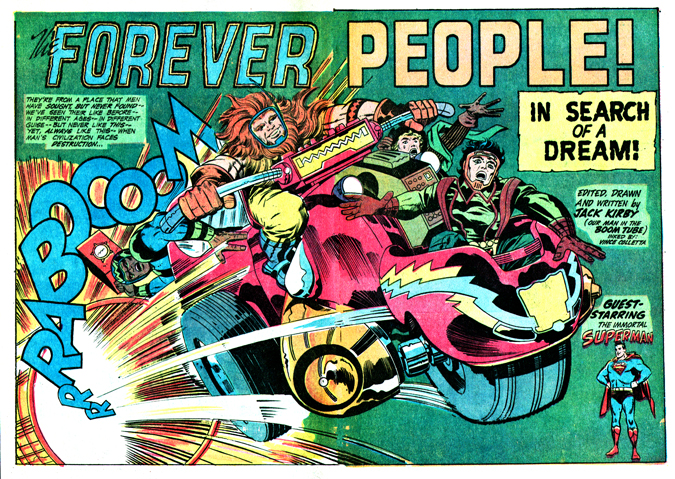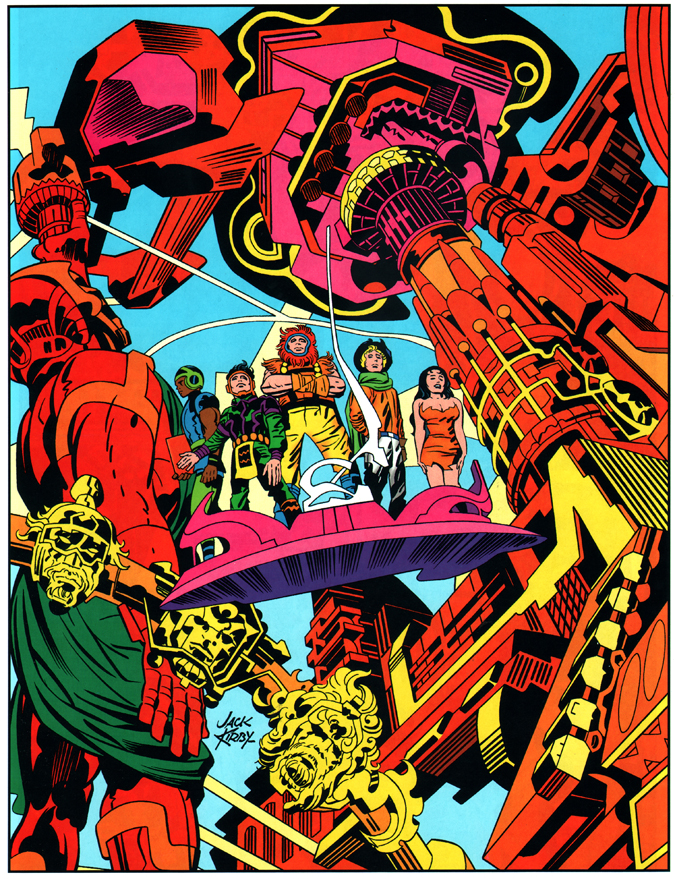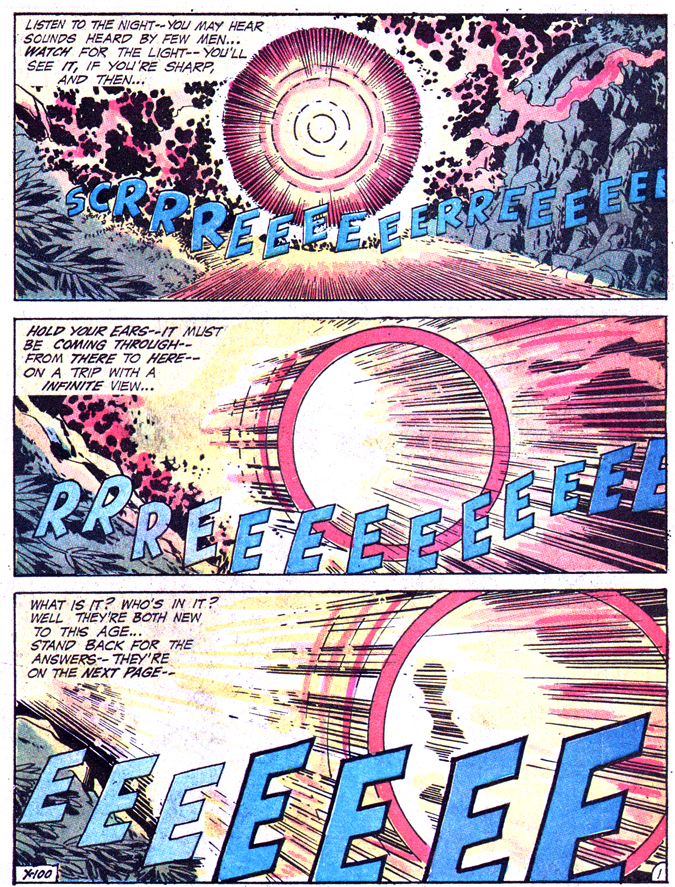ser·aph (sĕr´əf) n., pl. -aphs or aphim (-əfĭm) or aphin (-əfĭn). 1. A celestial being having three pairs of wings. Isaiah 6:2. 2. One of the nine orders of angels. See angel. [Back formation from plural seraphim, from Middle English seraphin, Old English seraphin, from Late Latin seraphim, seraphin, from Hebrew Sərāphīm, plural of sārāph.] —se·raph´ic (sī-rāf´ik), se·raph´i·cal adj. — se·raph´i·cal·ly adv.
— American Heritage Dictionary of the English Language
In 1950, Harvey Comics published the third issue of Boys’ Ranch, Simon & Kirby’s legendary Western comic book, a kind of continuing John Ford movie in four-color newsprint, which featured the exploits of adult Clay Duncan and three adolescent cowboys. Therein contained what Jack later called one of his favorite stories, an episode titled “Mother Delilah.”
“Mother Delilah” certainly is a remarkable tale, focusing on the most original member of the group, golden-locked, ornery orphan Angel, who boasts an angelic visage with long blond hair and itchy, lethal trigger-fingers. (Think the face of Kamandi.) The gun-totin’ melodrama is about saloon “girl” Delilah, who has a crush on Clay, who in turn has no time for fraternizing with lady folk — “Helping the boys run the ranch is a full time job, Del!”
Piqued by Clay’s rejection — there is an intimation that they may have been, umm, initmate at one time; though unspoken in this kids comic, Delilah is obviously a “soiled dove,” a prostitute of the prairie — Del schemes to get back at the rugged cow-puncher by appealing to Angel’s need for a mother figure.
Angel is one angry youngster, described as “that lead-slingin’ imp of Satan,” bitter and unhappy and quick to spew rage, but he does feel a kinship to his fellow Boys’ Ranchers and the kid’s loyalty to Clay is unending. But Del cracks Angel’s tough veneer and, for a time, whore and orphan play their respective roles as loving mother and devoted son (“I’m your maw… You’re my boy,” Del coos, Angel’s upturned jaw in her palm). For a brief spell, Angel experiences a maternal tenderness, a feminine kindness he always yearned for but never experienced…
Angel’s long golden hair is his trademark, a Samson-like source of strength, but Delilah charms the lad, “lulling Angel’s fears with motherly persuasion — using the mother love for all it is worth — knowing it is the one thing that can bend the boy to her will,” and the boy submits to the shears of the “daughter of sin.” In a shocking, wordless panel, jaw open, eyes wide Angel views the haircut’s damage in a hand mirror: a hack-job, cowlicks sticking out every which way. Then Delilah cackles in triumph, having emasculated Angel (and, by proxy, Clay Duncan), laughing manically as the sobbing boy, consumed with shame and hurt, bolts out the door.
Gunplay ensues with badmen, Angel’s hair grows at an unusually fast rate with his marksmanship skill recovering in pace, and, one fateful day at the Last Chance Saloon, Del, in a redemptive final moment, rushes to protect Clay, and (alas) is struck down by a dirty, lowdown sidewinder’s bullet. It is the final, lyrical panels that make the story a classic:
Holding the departed Del in his arms, Angel weeps over her corpse, as the town Virgil (named Virgil), recites: “And, thus it ends. But ever to repeat again and again in reality and rhyme — Love’s ever new — as morning’s dew — and hate is as old as time.”
Okay, so what the heck does a tearful, resonant 1950 cowpoke story with Old Testament allusions have to do with the shortest member of The Forever People? Well, I’m convinced that Serifan is really the Angel of New Genesis.
Jack describes Serifan as a “Sensitive” in the first issue, one who “turns on with fantasies” and drops into an open-eyed coma when making telepathic contact with Beautiful Dreamer. While he doesn’t possess the cowboy’s bitterness or predisposition to kill people — these are the peace-loving Forever People, after all — Serifan does share a similar forlornness and angst with the Old West youngster. While the character certainly has moments of levity, I detect a perpetual sadness about the Super-Kid, one that was never fully explained.
Another clue to the Angel connection is certainly Serifan’s Western garb and predilection for cowboy-and-Indians teevee shows (and use of the word “pardner”). But the New Genesis Kid’s gambler hat is decidedly different from Angel’s in that its hat band contains “cosmic cartridges”… we’ll get into the specifics of those metallic beauties under their proper entry to come, but sufficient to mention, them little pills can lead to mind-blowing experiences!
One final observation: When Darkseid zaps Serifan’s fellow group members with “Omega Effect finder beams,” but reprieves the cowboy copy-cat (out of atypical sympathy?), we see the sobbing boy from the back, as he laments “the fast fading vestige of all that was dear to him!” It is a visual echo of the final panel of “Mother Delilah,” where we observe the back of Angel as he kneels before the still figure of his “mother.”
“And it came to pass afterward, that he loved a woman in the valley of Sorek, whose name was Delilah. And the lords of the Philistines came up unto her, and said unto her, Entice him, and see wherein his great strength lieth, and by what means we may prevail against him, that we may bind him to afflict him: and we will give thee every one of us eleven hundred pieces of silver. And Delilah said to Samson, Tell me, I pray thee, wherein thy great strength lieth, and wherewith thou mightest be bound to afflict thee.” — The Bible, King James version, Judges 16:5-7









